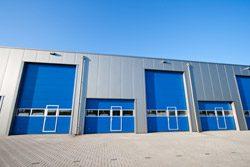The revitalisation of industrial parks across the country has taken centre stage at the Department of Trade and Industry, as South Africa seeks ways to breathe new life into communities that have been left out of the mainstream economy.
 Industrialisation has become more crucial to South Africa’s expansion plans amid a tough global economic environment.
Industrialisation has become more crucial to South Africa’s expansion plans amid a tough global economic environment.SAnews on Wednesday joined a Brand SA media tour to Limpopo to visit one of the five industrial parks in that province, Seshego Industrial Park. The park is managed and owned by the Limpopo Economic Development Agency (LEDA).
The park houses about 72 factories which include manufacturing, agro-processing, services and storage enterprises, among others. The Head of Land and Property Development at LEDA, Mouric Molepo, says they hope to see manufacturers more than any other industrialist renting space in the park because it is this sector that creates the most jobs.
Around 1 550 jobs have been created through the Seshego Industrial Park in large industries, while small industries in the industrial park have created about 240 jobs.
Molepo said LEDA is upgrading the park. “We have started with the security features and we have committed approximately R21 million. We are hoping that we will continue with revitalisation to increase job creation in the park and contribute to the economy of Limpopo.”
Industrialisation has become more crucial to South Africa’s expansion plans amid a tough global economic environment. The Regional Industrial Cluster Chief Director at the Department of Trade and Industry, Stieneke Samuel, said the department is working on a programme to revitalise industrial parks across the country.
“In Limpopo, to date, we are looking at two industrial parks. We have started and completed phase one of Seshego Industrial Park,” said Samuel.
She said 90% of all industrial parks across South Africa raised issues around security, as tenants occupying the parks need to be in an environment that works for them.
“We are looking at increasing support and increasing investor attractiveness to the park,” said Samuel.
She said security was a strong feature at the parks not only to deter criminals but also to set boundaries for tenants to prevent them from illegally occupying parts of the park they are not entitled to.
She envisaged that Seshego Industrial Park will create more jobs for the surrounding communities as more investors invest in operations in the park. She said historically, the parks were established outside the cities to keep “certain people in certain areas”.
“Ironically, skills were actually developed… You will find specialised skills in various areas where these parks are located,” said Samuel.
Building sustainable companies
One of the factories SAnews visited was Rebtex Pty Ltd, which specialises in sisal production. It distributes its products to big name building supply shops and other companies that sell carpets and products made of sisal.
Since sisal is extinct in South Africa, the company sources it from Brazil, Madagascar, Kenya and Tanzania.
Rebtex General Manager Marias Van Wyk said it takes about four years to grow the plant before it is ready for harvest.
Van Wyk said the company was established in 1976 and has distributed its works to as far abroad as Australia, among other countries.
The company has 70 employees and one of them, Lucas Semenya, has been with the company for about 30 years.
“I started off as an apprentice until I qualified to become an artisan. I have worked very hard with the owner. He motivated me to be the first artisan here,” he said with evident pride.
The company has an annual turnover of about R18 million. - SAnews.gov.za








